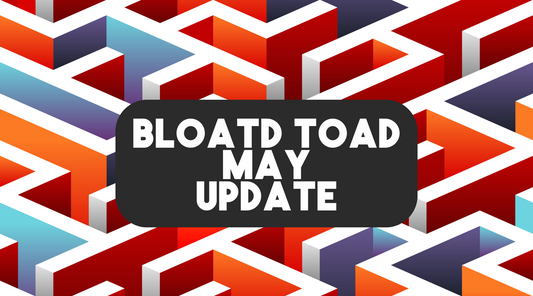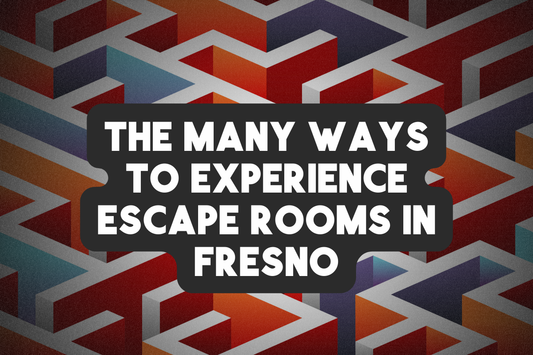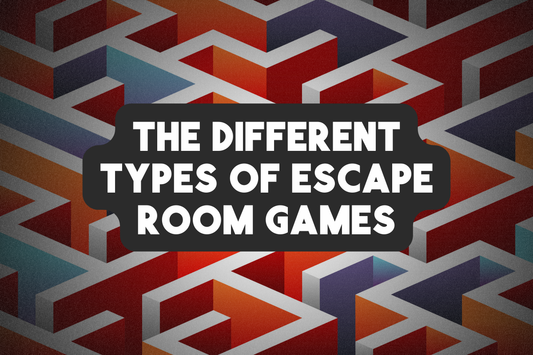Escape Room Clues vs Hints
Calvin KammerShare
If you’re new to escape rooms, you’ve probably heard about clues and hints—two words that seem similar but play very different roles in your game. Understanding the difference can help you enjoy your experience to the fullest and approach challenges like an escape room enthusiast!
What’s the Difference Between Clues and Hints?
-
Clues are part of the game itself. These are the pieces of information or items you’ll discover as you explore the room. Think of them as the breadcrumbs that guide you through the puzzles and storyline. You can’t win without clues—they’re designed into the game.
-
Hints, on the other hand, are optional. They’re given by your game master if you get stuck. A hint isn’t part of the original design, but it can help you get back on track if you’re struggling. Ideally, a good escape room can be solved without using hints, but they’re there as a safety net to make sure everyone has fun.
Why Do Escape Rooms Have Hints?
Hints exist because escape rooms are meant to be challenging—but not frustrating. Sometimes, you and your team might get stuck on a tricky puzzle, or you might overlook an important clue. Hints make sure you don’t get bogged down and help keep the game moving.
It’s important to know that asking for a hint isn’t “cheating.” In fact, many players use hints strategically to get the most out of their experience. After all, the goal is to have fun and enjoy the adventure, not to feel stressed or stuck.
How Many Hints Can You Use?
Some escape rooms have a limit on how many hints you can ask for (e.g., 3 hints per game). While this might sound fair, it can sometimes make the game feel unnecessarily stressful. Players might hesitate to ask for help, even when they really need it, because they don’t want to “waste” a hint.
Other escape rooms, including some of the best-designed ones, offer unlimited hints. This approach allows game masters to provide nudges tailored to your needs without worrying about hitting a limit. It also encourages players to stay engaged and experiment more freely.
How Game Masters Use Hints
Your game master is there to make sure you have a great time. They monitor your progress and provide hints when needed. The best game masters adapt their hints to your team’s situation, offering just enough help to get you thinking in the right direction without giving too much away.
Here’s how hints might look:
- A Gentle Nudge: A subtle clue to refocus your attention.
- A Thematic Hint: Delivered in-character to keep the story immersive.
- Direct Help: Given when a team is completely stuck and needs clarity to move forward.
With unlimited hints, game masters can have more fun, adding humor or personality to their hints, which makes the game even more memorable.
Tips for Using Hints as a New Player
If you’re new to escape rooms, hints can feel intimidating, but they’re really just a tool to enhance your experience. Here’s how to approach them:
-
Don’t Be Afraid to Ask: Hints are there to help. If you’re stuck and frustrated, asking for a hint keeps the game fun and engaging.
-
Communicate with Your Team: Make sure everyone agrees before requesting a hint to avoid confusion.
-
Think of Hints as Part of the Experience: Using a hint doesn’t mean you failed—it’s part of the game. Escape rooms are meant to be collaborative and interactive, and hints are just another way to interact.
Why Clues and Hints Matter for New Players
If a hint is essential to solving a puzzle, it’s no longer optional—it’s really a clue in disguise. A well-designed escape room doesn’t rely on hints to be solvable. As a new player, look for rooms that focus on clear, fair puzzles and avoid ones that might feel unfairly difficult without external help.
At the same time, don’t shy away from hints when you need them. They’re a great way to keep the game flowing and ensure you have fun from start to finish.
Final Thoughts: What Makes a Great Escape Room Experience?
As a new player, remember that escape rooms are all about teamwork, exploration, and problem-solving. Clues are there to guide you, and hints are there to support you. The best rooms balance challenge and accessibility, giving you just the right amount of push to feel both smart and successful.
So don’t be afraid to dive in, explore the puzzles, and ask for help when you need it. Your first escape room adventure should leave you feeling excited to play again—and maybe even ready to take on a tougher challenge next time!
This blog was written by the help of ChatGPT!






